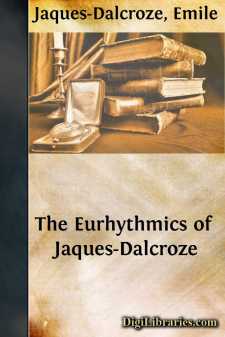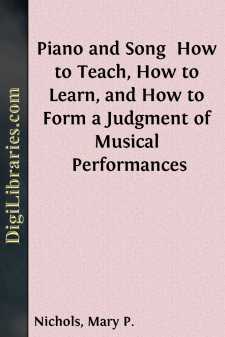Categories
- Antiques & Collectibles 13
- Architecture 36
- Art 48
- Bibles 22
- Biography & Autobiography 813
- Body, Mind & Spirit 142
- Business & Economics 28
- Children's Books 17
- Children's Fiction 14
- Computers 4
- Cooking 94
- Crafts & Hobbies 4
- Drama 346
- Education 46
- Family & Relationships 57
- Fiction 11829
- Games 19
- Gardening 17
- Health & Fitness 34
- History 1377
- House & Home 1
- Humor 147
- Juvenile Fiction 1873
- Juvenile Nonfiction 202
- Language Arts & Disciplines 88
- Law 16
- Literary Collections 686
- Literary Criticism 179
- Mathematics 13
- Medical 41
- Music 40
- Nature 179
- Non-Classifiable 1768
- Performing Arts 7
- Periodicals 1453
- Philosophy 64
- Photography 2
- Poetry 896
- Political Science 203
- Psychology 42
- Reference 154
- Religion 513
- Science 126
- Self-Help 84
- Social Science 81
- Sports & Recreation 34
- Study Aids 3
- Technology & Engineering 59
- Transportation 23
- Travel 463
- True Crime 29
The Eurhythmics of Jaques-Dalcroze
Categories:
Description:
Excerpt
THE EDUCATIONAL SIGNIFICANCE OF HELLERAU
At Hellerau two things make an ineffaceable impression upon the mind—the exquisite beauty of movement, of gesture and of grouping seen in the exercises; and the nearness of a great force, fundamental to the arts and expressing itself in the rhythm to which they attain. Jaques-Dalcroze has re-opened a door which has long been closed. He has rediscovered one of the secrets of Greek education.
A hundred years ago Wilhelm von Humboldt endeavoured to make Greek ideals the paramount influence in the higher schools of Germany. He and a group of friends had long felt indignant at the utilitarianism and shallowness of the work of the schools. In Greek literature, Greek philosophy and Greek art would be found a means of kindling new life in education and of giving it the power of building up strong and independent personalities. When there came to Humboldt the unexpected opportunity of reforming the secondary schools of Prussia, he so remodelled the course of study as to secure for Greek thought and letters a place which, if not central and determinative, would at least bring the élite of the younger generation in some measure under their influence. But his administrative orders failed to impart to the schools the spirit of ancient Greece. To Humboldt and his friends Greek studies had been an inspiration because, apart from their intellectual significance and literary form, those studies had been the channel of an artistic impulse and had been entered into as art. But this artistic power was not felt by the greater number of those who undertook, in obedience to the new regulations, the duty of teaching Greek in the schools. What was left in Greek studies after this failure of artistic insight was often no more than another form of purely intellectual discipline. A new subject had been added to the curriculum, but new life had not been brought into the schools. The very name, Gymnasium, which denoted their Hellenic purpose, seemed ironical. They were not Greek in spirit and they ignored the training of the body. Thus what Wilhelm von Humboldt had chiefly aimed at accomplishing, he failed to do. It was not the power of Greek art that he brought into the schools but, in most cases, merely the philological study of a second dead language. The cause of his failure was that he had not discovered the educational method which could effectually secure his purpose. He had assumed that, in order to introduce the Greek spirit into education, it was sufficient to insist upon the linguistic and literary study of Greek.
In time, attempts were made to remedy what was defective in Humboldt's plan by insisting upon physical exercises as an obligatory part of education in the higher schools. But the physical exercises thus introduced, though salutary in themselves, were divorced from the artistic influences of the Greek gymnastic. Humboldt's chief aim had been forgotten. His system of organization had rooted itself, but his educational ideal, to which he attached far greater importance than to administrative regulation, was ignored....












